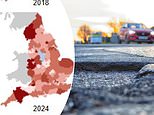It was early on Wednesday evening that Home Secretary Yvette Cooper started to realise the strategy she’d put in place to head off another night of mayhem on Britain’s streets was paying off. Reports from officers deployed at dozens of potential flashpoints were all telling the same story – the outbreak of disorder many had feared was not materialising.
But Ms Cooper remained ensconced in her third-floor office in London’s Marsham Street, munching on a burrito bowl, until she knew the worst of the danger had passed.
‘She was there until around 11.30pm,’ a Home Office adviser told me. ‘She wanted to be very sure everything was under control. You can’t afford to be complacent with this stuff.’

The riots that scarred the country in the wake of the appalling Southport killings have been billed as the first major test for Sir Keir Starmer and his new administration. And they’ve passed.
‘Obviously, the past fortnight has been tough and traumatic,’ one No10 aide admitted to me, ‘and we’ve got to remain vigilant. But having our first big crisis on a crime and sentencing issue has helped us. Because this is the policy area Keir knows best.’
Allies of Starmer and Cooper point to three key decisions they believe enabled them to get a grip on the unfolding public disorder. The first was an insistence that responsibility for the rioting was pinned firmly where it belonged. On far-Right extremists.
‘Keir and Yvette are well aware there are underlying issues,’ one government insider told me, ‘but they were very clear we had to ensure we didn’t give a shred of credibility to the rioters. They’re racist yobs – and it’s important the country sees that.’
A second factor was the way Cooper immediately instigated a system of regular liaison with the individual police chiefs responsible for tackling the lawlessness on the ground. In particular she remained in close touch with B.J. Harrington, a former Parachute Regiment reservist who cut his teeth policing Millwall football matches, before being appointed Chief Constable of Essex and the National Public Order lead.
‘When we arrived, a vacuum had developed in relations with the senior police officers,’ one Home Office official commented. ‘Yvette was clear we had to fill that gap.
‘It wasn’t a case of interfering operationally, so much as letting them know we had their backs and weren’t going to pop up on television attacking officers for being too woke.’
The most significant intervention, though, was the move to immediately fast-track sentencing of those convicted of participating in the violence. Ever since being elected Labour leader, Starmer has been something of a political enigma. And, as a result, his opponents have tended to try to caricature him as a rather wet, North London liberal.
Deep down he may be. But the past few days have provided one significant insight into Starmer’s character. Which is that he’s got a real taste for banging people up.
‘He chose to become Director of Public Prosecutions for a reason,’ a Downing Street official stated. ‘After the 2011 riots, he set up the 24-hour courts, and used to turn up in the middle of the night to watch people being processed.
‘He worked with the Americans on some properly heavy-duty terror prosecutions, too. He even pushed for tougher sentences for people who defaced war memorials. He can be old-school on these issues.’
This tough approach has delivered results. Reports of tattooed hardmen weeping in the dock as their sentences were handed down reassured the public its government was acting decisively to restore order. And it acted as a clear deterrent to those thinking of joining in the affray.
But while Starmer and his ministers are relieved at regaining control of the streets in relatively short order, they are only too aware of the deeper problems this brief summer of discontent presages.
‘It’s about sequencing,’ a minister told me. ‘We needed to adopt a hard line towards the rioters, and we couldn’t do anything that made it look like we were reacting to their agenda. But when the dust settles we know we’ve got some serious issues to address.’
Top of the list is the role played in the crisis by social media. Ministers and police chiefs have been shocked at the way fake propaganda about the riots was spread so rapidly, and how the rioters were able to use social media apps to mobilise activists, and outwit localised police deployments.
But one of the problems they have is that they have inherited a Whitehall machine geared almost exclusively to promoting social media use, rather than regulating it.
‘It was only a few months ago that Rishi Sunak was sitting down with Elon Musk, having a great love-in with him,’ one minister complained. ‘The entire government’s posture was aligned with Sunak’s pro-Silicon Valley agenda. There’s been no real appreciation of the threat the social media giants pose.’
Another problem ministers are alive to is the alienation felt in many of Britain’s white working class communities.


‘You don’t have to be Tommy Robinson [the far-Right agitator] to realise this is an issue,’ another minister conceded, ‘but it’s so difficult to grapple with. We just don’t have the resources to go in and transform every town in the country overnight. Or even the first five years of this government.
‘And that’s before you get to the issues of trying to co-ordinate among so many different relevant departments.’
And then there is the elephant in the room. Or rather, the elephant that is squatting across the beaches of southern England. Small boats.
Publicly, Starmer and Cooper are sticking to the line they have an established plan for tackling the migrant crisis. But government insiders acknowledge difficulties in getting the notoriously unwieldy Home Office bureaucracy to pivot away from the previous government’s Rwanda master-plan, to a more operationally focused approach.
‘The entire machine had frozen,’ one Home Office official revealed. ‘The removals regime had basically collapsed. They were all just working on Rwanda.
‘Yvette is clear we need to get people out, in particular the foreign prisoners clogging our jails. But the system has ground to a halt.’
One deportation flight has left for Vietnam, and two more are due to leave imminently as the Rwanda flights are ‘repurposed’. But some ministers are privately conceding they may have to contemplate more radical measures.
‘We can’t stick our heads in the sand on this,’ one told me. ‘We need to get illegal immigration under control. And Keir recognises that.’
The Prime Minister and his government have passed their first test. Much, much harder ones lie ahead.












